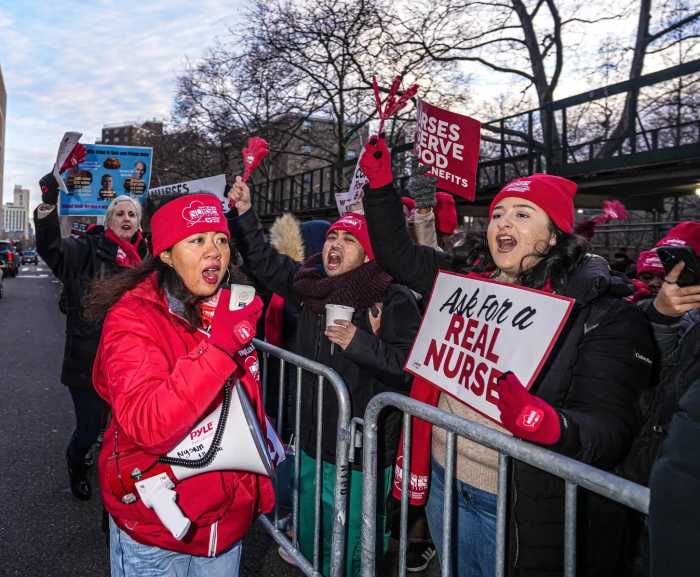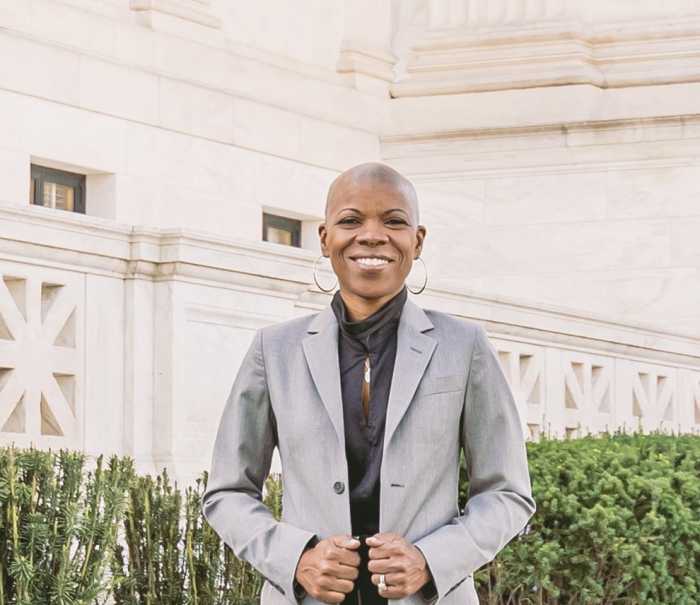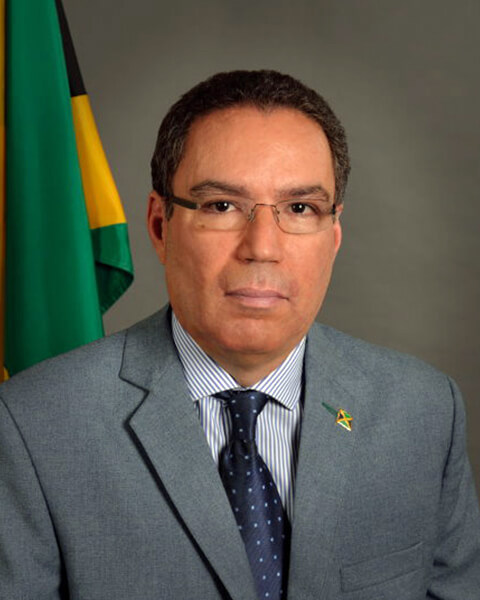N.Y. AIDS Activists Take Over President’s Campaign Office; 21 Arrested
Two weeks after Vice President Dick Cheney responded that he did not know about the growing number of HIV infections among the nation’s African-American women, AIDS activists from New York stormed the national headquarters of the Bush-Cheney campaign in Arlington, Virginia, in a bold protest that sought to underscore their message that the administration has willfully ignored the AIDS crisis.
Chained together, two separate groups of protesters, 21 in all, disrupted business for nearly two hours Monday at the nerve center of the president’s fiercely waged re-election bid.
Meanwhile, another 150 demonstrators lined up outside the office building, waved placards and denounced the Bush administration’s AIDS policies while police raced to the scene and arrested the chained protesters, many of them HIV-positive women. After cutting them loose with bolt cutters, police led the protesters to waiting police vans.
Many of the demonstrators are either employees of Housing Works, the New York City AIDS service provider, or members of ACT UP, the AIDS activist group, who traveled to Arlington on Monday morning in vans and buses, to spring the demonstration on Bush campaign officials.
“The only way you can make a statement is to be loud and in their face,” said Dianalynn Bodero, 37, a vice president of human resources at Housing Works, who was arrested along with six other protesters who chained themselves to the front door. Bodero said that the action was planned well before the vice presidential debate on October 5, but that Cheney’s remarks “added fuel to the fire.”
Bodero said, “We have a vice president who went on the air, live, and said he had no idea of this crisis among African-American women.”
During the vice presidential debate, PBS correspondent Gwen Ifill, the moderator, specifically asked Cheney to address the alarming statistic that America’s black women between the ages of 25 and 44 are 13 times more likely to die of the disease than their white counterparts. In his reply, Cheney defended the Bush administration’s global AIDS policy and responded he was “not aware” of the crisis among African-American women.
In his rebuttal, Sen. John Edwards, the Democratic nominee, also addressed the global AIDS problem without ever answering Ifill’s question as to what the government’s role should be “to end the growth of this epidemic.”
Olivia Brown-Dawson, 40, a development associate at Housing Works, was among the group of seven chained to the front door. An African American, she felt compelled to join the Virginia protest, she said, because “the black and Latino community can’t stand another four more years of George Bush,” citing “40,000 new HIV infections annually” without an adequate response from the federal government.
Bodero said that the Centers for Disease Control has corroborated the 40,000-infection statistic.
As well as seeking to shed light on the domestic AIDS crisis, other protesters, such as Sharonann Lynch, of ACT UP, drove to Virginia to blast the Bush administration’s policy on global AIDS.
“The Global Fund was our global beef on Monday,” Lynch said, charging the administration with shortchanging the international fund that has been established to provide treatment and life-saving medicines in hard-hit regions, such as Sub-Saharan Africa.
Since his pledge in 2003 to spend $15 billion over five years to fight global AIDS, Bush has been criticized for not requesting annual congressional appropriations of $3 billion to meet the target and also for the administration’s insistence on abstinence-only educational programs and its resistance to wider freedom for developing nations in purchasing low-cost generic medicines instead of patent-protected name brands.
Various Bush-Cheney campaign sites around the nation have been targets of protest actions and vandalism, including two on October 5—in Milwaukee, where labor organizers staged a sit-in, and in Orlando, Florida, where 100 protesters ransacked an office. Other Bush campaign offices have reported shots being fired through windows.
The October 5 events prompted Marc Racicot, the Bush campaign chairman, to send a letter to the AFL-CIO president, John Sweeney, accusing the union of staging illegal entries. Sweeney fired back in an October 14 statement, calling Racicot’s letter “dirty politics” and denying that the union promoted violent protest actions.
“Working people are frustrated and angry that the Bush administration implemented cuts in the right to overtime pay that affect six million American workers,” Sweeney wrote.
The protest at the Arlington headquarters on October 18 appears to be the first AIDS-specific action taken against a Bush campaign office, in this case targeting a nondescript suburban office building where top G.O.P. strategists communicate daily with the president and the White House.
“Even police asked us, ‘Why are you doing this here?’” said one arrested protester, Robin Milim, 48, a Housing Works computer instructor. Authorities held her on a $1,000 bond, said Milim, because of prior arrests and several convictions, including drug-related offenses.
“I have been in recovery for five years,” said Milim, who is HIV-positive. “Before I was ignorant, but now I am inspired to act.”
Milim said employees from other companies in the office building applauded her as she sat chained in the lobby. Milim shed light on the rather elaborate plan to storm the building.
“The people chained inside the actual office had a separate van that took them down there and went inside in this real ‘I Spy’ operation,” said Milim.
Mark Goldstone, a Washington attorney who is representing the 21 arrested New Yorkers, said their treatment by police was “wonderful, with the exception of one woman,” a transgendered protester who claims she was frisked by a male police officer against her wishes. Goldstone said he is considering filing a complaint. Daisy Luina, 36, a Housing Works thrift store employee, who self-identifies as a “butch,” said that she was one of the group who was chained upstairs in the G.O.P. office and after being led downstairs by a female officer, a male officer approached and began to pat her down.
“I identified myself as a female and he said he was a supervisor and kept patting me down.”
An Arlington police spokesman, Det. John Ritter, said that police procedures were followed in searching Luina, and e-mailed a copy of the department’s regulations on frisking prisoners during non-strip searches. That passage stipulates that “an officer should have a witness present when it becomes necessary to search a prisoner of the opposite sex,” which Ritter said occurred. Luina said that a female officer conducted a second frisk inside the Arlington County jail.
Goldstone said that he is negotiating with Virginia prosecutors about whether or not the New Yorkers have to appear this Friday for scheduled court dates.



































